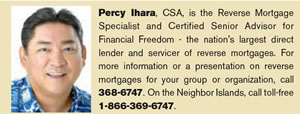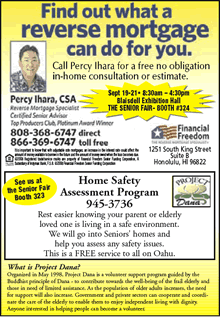Hawaii’s Leading Reverse Mortgage Company at Senior Fair Sept.19-21
By Percy Ihara
Certified Senior Advisor for Financial Freedom
A reverse mortgage is a loan that enables senior homeowners, age 62 and older, to convert part of their home equity into tax-free* income-without having to sell their home, give up title to it or make monthly mortgage payments. The loan only becomes due when the last borrower (s) permanently leaves the home. *Consult a tax advisor. Not all products available in all states.
1.How is a reverse mortgage like a home equity loan? How is it different?
Both a reverse mortgage and a home equity loan use the equity you have built up in your home to provide you with readily available cash.
They differ in that with a home equity loan you must make regular monthly payments of principal and interest. However, with a reverse mortgage you do not make any monthly mortgage payments for as long as you stay in the home.
2.Can my current income influence my ability to get a reverse mortgage?
No. Since reverse mortgage borrowers need not make monthly repayments, there are no income qualifications.
3.What are the advantages of a reverse mortgage?
There are many. Here are a few of the most significant:
* Remain independent.
A reverse mortgage allows you to remain in your home and retain home ownership.
* Stay in your home.
It allows you to remain in your home and retain home ownership.
* No monthly mortgage payments.
You need not pay back the reverse mortgage loan nor make any monthly mortgage payments until you permanently move out of the home.
* Tax-free money.
Because the money you receive from a reverse mortgage is not considered income, it is tax free* and will not affect your Social Security or Medicare benefits.
* Freedom and flexibility.
The money you get from a reverse mortgage is yours to use in any way you choose. *Consult a tax advisor.
4.I’ve heard that with a reverse mortgage the lender would own my home. Is this true?
It’s absolutely false. The borrower retains title to the property. The reverse mortgage lender is merely extending a loan to the borrower.
Because the homeowners retain title, they remain responsible for the payment of property taxes, insurance, utilities, home maintenance, and other expenses - just as they would with a standard first mortgage or home equity loan.
5.Can I refinance a reverse mortgage, as I would be able to do with a traditional home mortgage?
Yes. Refinancing can make sense if your home increases in value or interest rates drop.
6.Is it possible for my loan balance to become greater than the value of my home?
No. You can never owe more than what your home is worth. What’s more, since the reverse mortgage is what is known as a “non-recourse” loan, the lender cannot seek repayment from your income, your other assets or your estate. In other words, the house stands for the debt.
7.Can a reverse mortgage lender take my home away if I outlive the loan?
No they cannot. And the loan is not due at that time either. In fact, you don’t need to repay the loan as long as you or another borrower continues to live in the house and keep the taxes paid and insurance in force.
8.Is there a choice in how I receive the cash from my reverse mortgage?
Most definitely. With most reverse mortgages you have a wide range of payment options, one of which should be ideal to meet your financial needs.
* You can choose to receive the money all at once, as a lump sum.
* You can receive equal monthly payments as long as one of the borrowers lives and continues to occupy the property as a principal residence.
* You can choose to receive equal monthly payments for a fixed period of months.
* You can get a line of credit*; which allows you to take funds at times and in amounts of your choosing until the line of credit is exhausted.
This is the most popular option, chosen by more than 60 percent of reverse mortgage borrowers.
* You can opt for a combination of line of credit with monthly payments for as long as the borrower remains in the home. * Or, finally, you can choose a combination of the above.
9.I still owe money on a first or second mortgage. Can I still get a reverse mortgage?
Yes. You may be eligible for a reverse mortgage even if you still owe money on a first or second mortgage.
The funds you would receive in the reverse mortgage would be used to pay off whatever existing mortgages you have on the property.
10.Can I get a reverse mortgage on a second home or resort property I own?
Unfortunately no. Reverse mortgages may only be taken out on your primary residence.

11.Would a home that is in a “living trust” be eligible for a reverse mortgage?
Yes. In most cases a homeowner who has put his or her home in a living trust can usually take out a reverse mortgage.
A review of the trust documents would be made by the reverse mortgage lender to determine if anything in the living trust would be unacceptable.
E-mail this story | Print this page |
Comments (0) | Archive |  | RSS
| RSS
Most Recent Comment(s):




 Del.icio.us
Del.icio.us












